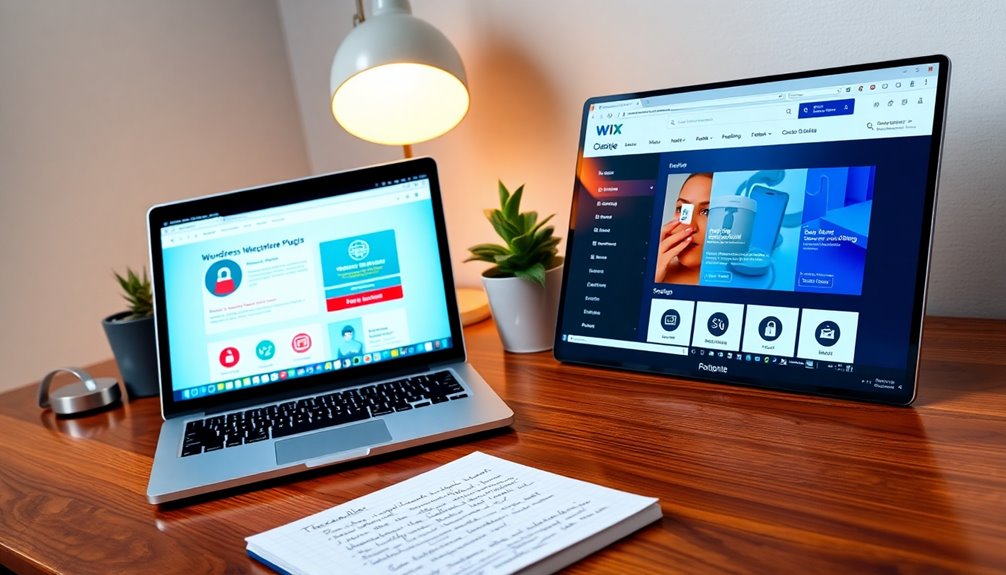When comparing WordPress and Wix for online marketing, you'll find they cater to different needs. Wix is user-friendly with a drag-and-drop interface, perfect for beginners. However, its customization options are limited. On the other hand, WordPress offers extensive plugins and themes, giving you more flexibility for advanced marketing strategies. WordPress also tends to perform better in SEO and scalability, making it ideal for growing businesses. While Wix is great for small projects, WordPress shines for serious marketers. If you're curious about how these platforms can align with your marketing strategy, more insights are just ahead.
Overview of Wix and WordPress
When choosing a platform for online marketing, understanding the differences between Wix and WordPress is essential.
Wix is a user-friendly website builder with a drag-and-drop interface, perfect for beginners. It offers over 800 free templates and built-in SEO tools, along with email marketing automation, making it a convenient choice. However, customization options are limited once you select a template. Additionally, Wix's built-in SEO tools, while helpful, do not offer the same level of flexibility as WordPress plugins. Furthermore, using security plugins can help enhance the overall safety of your website.
On the other hand, WordPress is a powerful content management system (CMS) that provides extensive customization options through thousands of plugins and themes. While it requires you to manage your hosting and security, it allows for greater design flexibility. For advanced users, WordPress's reliance on third-party plugins like Yoast SEO for SEO tools can be a worthwhile trade-off. Additionally, regularly updating content can significantly enhance your website's SEO performance, making WordPress a favored option for long-term online marketing strategies.
Cost Comparison
When considering cost, you'll find that Wix offers clear pricing plans that simplify budgeting, while WordPress presents a more variable structure. You'll need to evaluate the long-term cost implications of hosting and potential hidden fees associated with both platforms. Additionally, consider the importance of affordable cloud storage options for backing up your WordPress site, as this can influence overall costs over time. Utilizing options like Google Drive for backups can provide substantial savings and peace of mind regarding data safety. Moreover, incorporating reliable cloud storage solutions can further enhance your website's security and data management efforts. Understanding these factors will help you make an informed choice that fits your financial goals.
Pricing Plans Overview
A clear cost comparison between Wix and WordPress reveals significant differences in their pricing structures.
Wix offers a freemium model with premium plans ranging from $17 to $159 per month, which include hosting and remove ads.
In contrast, WordPress pricing starts at $4 per month for basic features on WordPress.com, while hosting costs for WordPress.org can be as low as $1.99 per month.
When it comes to eCommerce plans, Wix's core plan begins at $36 monthly.
As for long-term options, WordPress generally provides more flexibility with its thousands of free plugins and themes, while Wix pricing plans can escalate quickly with added features, making it essential to evaluate your specific needs for a thorough features comparison.
Long-term Cost Implications
Evaluating the long-term cost implications of using Wix versus WordPress reveals important considerations for businesses planning to scale.
While Wix's premium plans can range from $17 to $159 per month, their pricing structure may lead to significant long-term costs as you add features.
On the other hand, WordPress itself is free, but you'll need to budget for domain registration and hosting solutions, typically costing between $50 to $150 annually.
With WordPress, you can take advantage of free plugins, which can help reduce expenses over time.
Ultimately, WordPress offers greater flexibility and scalability without the risk of hidden expenses that often accumulate with Wix, making it a more economical choice for growing businesses.
Hidden Fees Considerations
While both Wix and WordPress present appealing options for building websites, hidden fees can greatly impact your overall budget.
Wix's Premium Plans, while starting at $17/month, can lead to additional costs as you may need to upgrade for essential features like e-commerce.
Don't forget domain registration costs, which are included initially but require annual renewal at $10 to $20.
On the other hand, WordPress has hosting expenses ranging from $36 to $600/year, plus additional costs for premium themes (up to $130/year) and plugins (up to $129/year).
As your business grows, scalability costs can also add up.
Consider these hidden costs carefully to guarantee you choose the platform that best fits your financial plan.
User Experience and Ease of Use

How do you choose between WordPress and Wix when it comes to user experience and ease of use?
If you're a beginner, Wix might be your best bet with its user-friendly drag-and-drop interface, allowing for quick site creation without coding skills. Its ease of use is appealing, especially with over 900 responsive templates, though switching templates later requires starting over. Additionally, Wix's simplicity makes it an attractive option for users who want to avoid the complexities of managed hosting that come with more advanced platforms. Furthermore, Wix's straightforward design process is similar to the intuitive experience offered by top-tier form builder plugins, making it accessible for users of all skill levels.
On the other hand, WordPress offers extensive customization options with thousands of themes and plugins that can enhance your site.
However, its steeper learning curve could be overwhelming for those with limited technical knowledge.
Both platforms support basic SEO tools, but WordPress excels in optimization capabilities, giving advanced users greater control over their site's performance and user experience. Additionally, performance optimization is crucial for maintaining user retention and satisfaction on any website.
Template and Design Options
When it comes to template and design options, both Wix and WordPress offer distinct advantages that cater to different user needs.
Wix provides over 800 free templates tailored for various website types, making it easy for those without technical skills to create visually appealing sites. However, once you select a template, you can't change it, which might limit your design flexibility as your branding evolves.
On the other hand, WordPress boasts thousands of themes, allowing you to switch easily between them. Many WordPress themes come with extensive customization options, enabling you to adjust colors, layouts, and styles for a unique design. For instance, themes like Divi(#) offer a live preview feature that allows real-time customization. Additionally, certain themes like Astra(#) provide over 1000 theme options, enhancing overall design flexibility.
While Wix simplifies the process with its AI-driven design tools, WordPress offers deeper customization for those willing to engage in manual adjustments.
Key Features and Functionalities

When you're choosing between WordPress and Wix, understanding their key features and functionalities is essential.
You'll find significant differences in template variety, e-commerce capabilities, and SEO tools that can impact your online marketing strategy. Additionally, considering the reputable hosting providers available for each platform can greatly affect your site's performance and reliability. Plugins are crucial for e-commerce websites to enhance functionality and safeguard customer data, ensuring a seamless shopping experience. A reliable hosting provider can significantly improve site performance and ensure your website remains accessible to customers.
Let's break down how each platform stacks up in these areas.
Template Variety Comparison
While both WordPress and Wix provide a range of templates to help you create an appealing online presence, their approaches differ greatly in functionality and flexibility.
Wix offers over 800 free templates, optimized with built-in features for specific needs, but once you choose a template, you can't change it without rebuilding your site.
In contrast, WordPress boasts thousands of free and paid themes, allowing you to switch templates easily without losing your content, which enhances your customization possibilities.
Both platforms emphasize responsive design, ensuring your site looks great on all devices—crucial for online marketing success.
Ultimately, your choice in this template variety comparison will depend on your need for flexibility versus the convenience of built-in solutions.
E-commerce Capabilities Overview
E-commerce capabilities play an essential role in your choice between WordPress and Wix for online marketing.
Wix eCommerce features, like Wix Stores, allow you to set up an online store using built-in tools, manage inventory, and process payments easily.
However, if you seek WordPress eCommerce flexibility, WooCommerce offers extensive customization options, supporting multiple payment gateways and advanced shipping.
Scalability is another key factor; while Wix suits small to medium stores, WordPress can grow with your business, handling larger traffic and content.
Additionally, consider transaction fees—Wix imposes fees per transaction, whereas WordPress with WooCommerce has no extra charges beyond payment processor fees.
This flexibility and cost-effectiveness make WordPress a compelling option for serious eCommerce ventures.
SEO Tools Assessment
SEO tools play an essential role in boosting your online visibility, and both WordPress and Wix offer distinct features that cater to different needs.
Wix provides integrated SEO tools, like an SEO Wiz that crafts personalized plans and automates sitemap creation, making it user-friendly for those without technical skills.
On the other hand, WordPress excels in SEO capabilities, thanks to plugins like Yoast SEO, which allow for advanced optimization and meta tag management.
You'll find extensive customization options for SEO on WordPress, empowering you to tailor your site's structure and content effectively.
Both platforms boast mobile optimization features, vital for search ranking enhancements, but WordPress offers more flexibility through its wider range of SEO plugins and tools.
SEO Capabilities
When you're diving into online marketing, understanding the SEO capabilities of your chosen platform is essential.
WordPress is renowned for its extensive SEO tools, while Wix offers more basic features. Here's a quick comparison:
- WordPress: Customizable meta tags, advanced features like Yoast SEO, and detailed optimization options.
- Wix: Built-in SEO tools and the SEO Wiz for personalized optimization plans, but lacks the flexibility of WordPress.
- Mobile Optimization: Both platforms support it, but WordPress gives you greater control over mobile-specific settings.
If you're serious about improving your site's visibility on search engines, WordPress stands out with its optimization potential and advanced SEO capabilities, making it the better choice for all-encompassing strategies. Additionally, the importance of theme selection for SEO cannot be overlooked, as it significantly impacts your website's performance and visibility.
Email Marketing Tools

Choosing the right email marketing tools can greatly impact your online marketing success.
Wix email marketing offers a free tool with user-friendly templates and automation features, making it perfect for beginners. You can easily engage customers and track campaign performance. For enhanced outreach, Wix integrates with services like Omnisend, allowing for effective segmentation and analytics.
On the other hand, WordPress provides extensive integration options with various email marketing plugins, such as Mailchimp and Constant Contact.
These plugins offer advanced functionalities, enabling you to customize your campaigns effectively. With automation features available through plugins like Omnisend, you can streamline your email marketing efforts and improve engagement.
Ultimately, both platforms cater to different needs, so choose based on your marketing goals.
Customer Support Availability
Customer support can make or break your experience with a platform, and here, Wix clearly stands out. Wix offers multiple channels for customer support, ensuring you can get help whenever you need it.
In contrast, WordPress support is primarily community-driven, which can lead to fragmented assistance.
Here's what you can expect from Wix's customer support:
- 24/7 availability through phone, live chat, and social media.
- Quicker response times compared to WordPress, making problem resolution faster.
- A Help Center packed with extensive resources and community forums for additional support.
While WordPress.com provides live chat for premium users, free and lower-tier users often struggle with limited assistance.
With Wix, you'll likely feel more supported in your online marketing efforts.
Security Features

When it comes to security features, Wix offers a straightforward, automated approach that's great for beginners.
In contrast, with WordPress, you're responsible for implementing security measures, which can vary widely based on your choices.
Understanding these differences can help you decide which platform better fits your security needs.
Wix Security Measures
While building your website on Wix, you can rest easy knowing that the platform prioritizes security with a robust array of features.
Wix security measures are designed to protect your site and its users effectively. Here are some key features:
- Free HTTPS encryption guarantees secure data transfer between users and your site.
- Two-step verification enhances account protection, keeping unauthorized access at bay.
- Fraud prevention partnered with Forter guards online transactions, especially for e-commerce.
Additionally, Wix performs automatic backups, allowing you to revert to previous site versions easily, and includes built-in defenses against DDoS attacks, keeping your website running smoothly.
With these thorough measures, you can focus on growing your online presence with peace of mind.
WordPress Security Considerations
Wix offers strong security measures, but if you opt for WordPress, you'll need to take an active role in safeguarding your site.
Your WordPress security largely depends on your choice of hosting provider and the implementation of security plugins like Wordfence or Sucuri, which defend against malware and hacking attempts. Regular updates to the WordPress core, themes, and plugins are essential, as outdated software can create vulnerabilities.
Implementing strong passwords and two-factor authentication will further enhance your security, with many hosting providers offering these features. Don't forget to purchase SSL certificates separately to guarantee secure HTTPS connections.
While WordPress allows for extensive customization, be cautious with third-party themes and plugins that could introduce security risks if not regularly vetted.
Scalability and Flexibility
As your business grows, the need for a scalable and flexible platform becomes essential. WordPress excels in these areas, supporting extensive scalability through its vast ecosystem of over 59,000 plugins and customizable templates. This makes it ideal for large-scale content management and eCommerce solutions.
In contrast, Wix has limitations in flexibility, as you can't switch templates after selection, which can restrict design changes.
Consider these key points:
- Scalability: WordPress can accommodate rapid growth without needing to switch platforms.
- Customization: With numerous plugins, you can tailor your site to fit evolving needs.
- Migration: Easily change from WordPress.com to WordPress.org for more control.
Choosing the right platform can greatly impact your business's success.
Best Use Cases

When you're deciding between WordPress and Wix, understanding their best use cases can help you choose the right platform for your needs.
If you're a small business or working on a personal project, Wix's user-friendly interface and integrated tools are perfect for quickly establishing an online presence. Its built-in SEO features and email marketing tools streamline your online marketing efforts.
On the other hand, if you're focused on blogging or need extensive customization, WordPress shines with its vast array of plugins and themes.
For eCommerce capabilities, WordPress offers advanced options like WooCommerce, while Wix caters to service businesses with scheduling tools.
Ultimately, consider your specific needs to determine whether Wix vs WordPress is the best fit for you.
Performance and Speed
While both WordPress and Wix have made strides in performance and speed, their approaches differ considerably.
WordPress typically maintains better page load speed thanks to optimized themes and a variety of caching plugins. Wix has improved, but its heavy client-side JavaScript can slow things down.
Here are some key aspects to evaluate:
- Caching tools: WordPress offers more advanced options for speed optimization.
- Image optimization: Both platforms help compress images, but implementation varies.
- Performance monitoring: WordPress has numerous plugins for tracking speed, while Wix includes built-in tools.
Ultimately, faster loading times on either platform can boost your SEO rankings, but WordPress's flexibility often gives it an edge in performance-driven marketing strategies.
Final Recommendations

To maximize your online marketing efforts, choosing the right platform is essential.
If you're aiming for advanced SEO capabilities and superior content management, WordPress offers extensive plugins like Yoast SEO that enhance your optimization strategies. For email marketing integration, WordPress allows deeper automation through various plugins, boosting effectiveness.
However, if you prefer built-in marketing features with less setup, Wix includes integrated email marketing tools and social media sharing options.
To track your marketing performance accurately, WordPress provides seamless integration with Google Analytics, offering thorough insights.
Ultimately, if you want flexibility and power, go with WordPress. But if you're a beginner seeking simplicity, Wix might be the better choice for you.
Choose wisely based on your marketing goals!
Conclusion
In the battle of Wix vs. WordPress, your choice ultimately hinges on your specific needs. If you crave simplicity and quick setup, Wix might just feel like a refreshing change. But if you're after unmatched flexibility and scalability, WordPress is a powerhouse that can grow as your ambitions skyrocket. No matter the platform, you can build an online presence that's not just good—it's spectacular. Choose wisely and watch your marketing dreams take flight!



